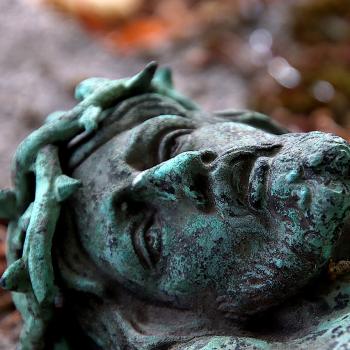Buried underneath endless sediment of vitriol, spite and calcified heterodoxy, Matthew Paul Turner’s book Our Great Big American God has something meaningful to say. I think it has something to do with how we as a culture try to project our own nature onto God. Mark Twain, a person likely as hostile to evangelicalism as Mr. Turner, still managed to make an articulate point: “In the beginning God made man in His image; man, being a gentleman, has sought to return the favor.” About midway through his book, I asked myself why Mr. Turner wrote Our Great Big American God, rather than simply tweeting Mr. Twain’s quote and going to bed? It would have saved him and us (mostly us) much trouble.
a gentleman, has sought to return the favor.” About midway through his book, I asked myself why Mr. Turner wrote Our Great Big American God, rather than simply tweeting Mr. Twain’s quote and going to bed? It would have saved him and us (mostly us) much trouble.
Our Great Big American God opens the way so much of Religious Left’s literature does: By giving a microphone to the poorest theology of evangelicalism. “America’s been very good to God,” Turner’s friend tells him over coffee. “Where would God be without America?” Apparently this absurdity deserves more than a laugh (to the tune of 200+ pages). Turner then announces he will tour America’s Christian history in order to understand its complicated relationship with God. The book doesn’t really have a guiding thesis; the reader is asked to more or less assume that a sermonizing satire on evangelicalism is good for its own sake.
Turner’s first stop in his tour of America’s Christianity is the Puritan arrival in the New World. Turner emphasizes the supposed continuity between biblical Israel and the Puritan sojourners that was taught by men like John Cotton. Cotton “single-handedly steered the course of God’s future in the same direction that the Puritans were headed.” (21) This early replacement theology set the stage, Turner writes, for the Puritans’ integration of religious and civil authority as well America’s sense of divine destiny.
I can’t imagine this thesis is seriously controversial, especially within the circles that will buy and share Turner’s book. It’s been written about plenty of times before, and from where I sit, those evangelicals who would read books about evangelicalism are seeking to better sieve their faith of its strictly red, white and blue doctrines. The same is true of Turner’s later arguments, including the individualizing, populist appeal of 19th century evangelical revivalism, the religious debates over slavery and the weaponizing of Christianity for the Religious Right. It’s not that his general points in these sections are terribly incorrect; it’s that they’ve all been heard before.
Luckily the book gets more interesting. Not content to heap scorn on any Christian born before the 20th century, Turner punctuates his “history” with rants about the theologians and theologies he finds offensive. And boy, is he offended.
Let’s just say that Turner really hates Calvinists. I mean, really hates them. His section on the Puritans feels like it will never end for his constant platforming about how evil these theologians were. His animus builds towards a crescendo that sounds just like a page out of Chris Hitchens:
Many Calvinists today celebrate grace like hunters celebrate a fresh kill, jumping proudly around it like it’s a carcass that they own and fully intend to cut up, freeze, and eventually eat. Sometimes they stuff it or hang it in their offices so others can see and enjoy from afar the grace they shot and killed. Calvinists aren’t exactly selfish with grace; they just know that hunted “grace” is an acquired taste and not intended for everybody.(46)
This paragraph comes after a very awkwardly placed diatribe against Justin Taylor and John Piper for their well-known reactions to Rob Bell’s book Love Wins. Turner is especially incensed at Piper’s (in)famous “Farewell” tweet: “That’s what happens when God is left in the hands of angry people of faith…The big sovereign God that Christians usually boast about becomes a small and narrow-minded deity…” (30). The placement is intentional, of course; Turner wants us to associate criticism of Bell’s views with cruel Puritanism. Still, the naked rage Turner is unable (or unwilling) to restrain undermines his credibility as a historian.
Not that his credibility is that good to begin with. Turner’s treatment of the Anne Hutchinson controversy is highly misleading. He frames the issue in terms of her gender and spirituality; never once does he mention Hutchinson’s well-known antinomianism. Likewise he portrays Roger Williams as a helpless victim of the ruthless Calvinistic enforcers; yet if  Calvinism is what Mr. Turner says it is, didn’t the Calvinistic Roger Williams (a little fact unmentioned by the author) simply reap what he sowed?
Calvinism is what Mr. Turner says it is, didn’t the Calvinistic Roger Williams (a little fact unmentioned by the author) simply reap what he sowed?
Turner wants to tie in American evangelical history with a searing critique of traditionalist faith. The problem in his approach is a glaring absence of actual Scripture. Turner discusses not one biblical passage in-depth, nor does he care to do actual theology in evaluating evangelical trends. Given his one salient point–that America has shaped God to fit its image–this is a very disappointing trait. It handicaps the usefulness of the book. Progressives will hear what they already think, though without any new evidence, and conservatives will spot a drive-by. Again, I have to ask: Why was this book created?
Turner’s experience as an editor for CCM Magazine (he was fired in 2002) does warrant some interest in his take on evangelical subculture. Unfortunately, Our Great Big American God features not one perspective that would require unique life experiences. It’s the recycled rancor of Emergent Village, the outrage culture of a movement that blasts the values of Lifeway but still think it unfair that their books aren’t sold there. There are things evangelicals can learn from the Religious Left, but they aren’t here.
















